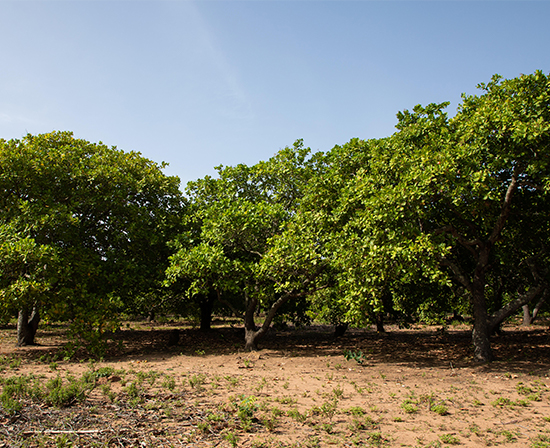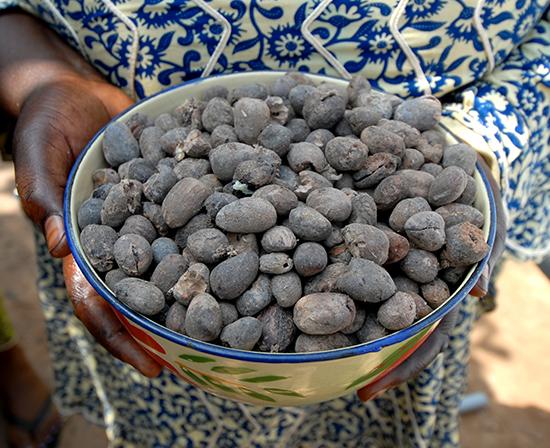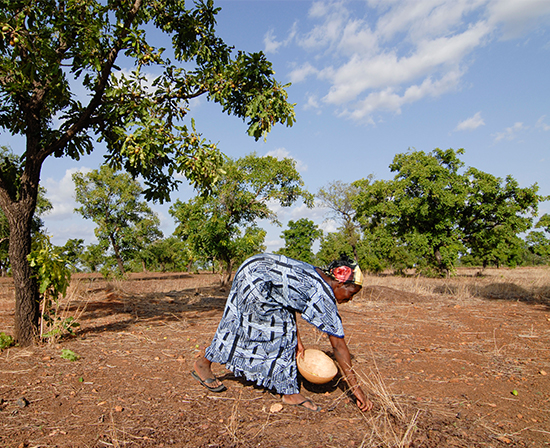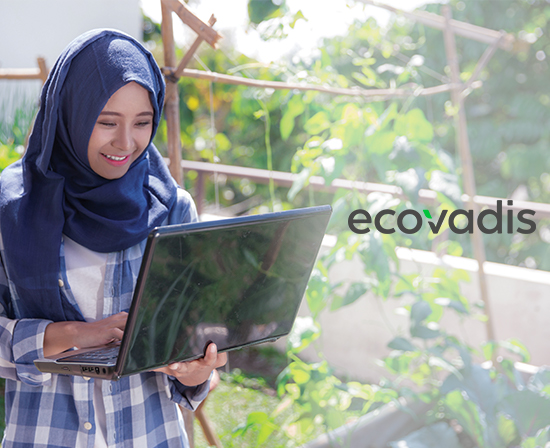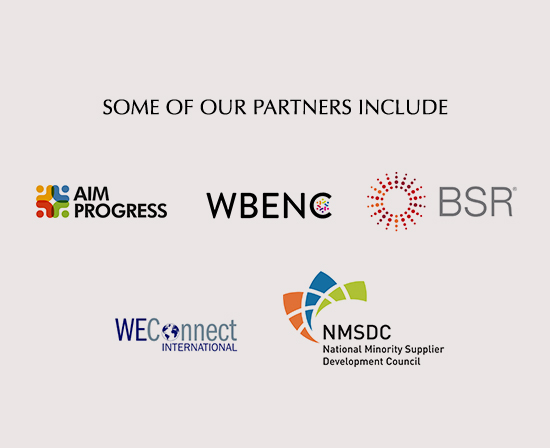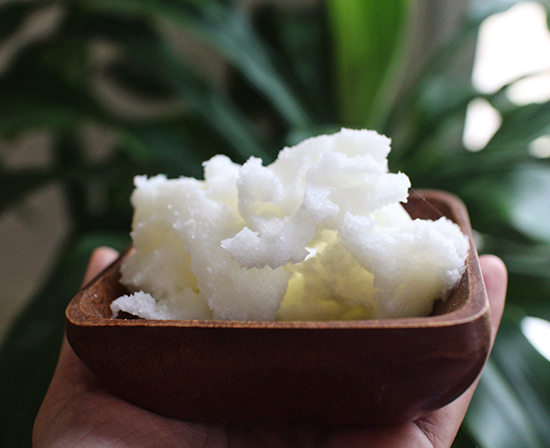Hong Kong
Responsible Sourcing
Responsible Sourcing
We source high-quality ingredients and materials from around the world to manufacture our products, working diligently to source responsibly and with attention to potential impacts on people and environment.
We collaborate with a wide and diverse network of suppliers. In doing so, we aim to continuously improve and strengthen our sourcing practices while remaining sensitive to the local communities in which we operate. Our policies and programs embody our deeply held values and long heritage of responsibility.
We pride ourselves on our commitment to operating ethically — we hold ourselves accountable for the impact we make and the influence for good we can have everywhere we do business.
William P. Lauder, Executive Chairman
Sensitive Supply Chains
Our company has a long history of sourcing raw materials from environments that are rich in biodiversity, with more than half of the raw materials we use derived from plant origin. As threats to the world’s natural resources increase, we continue to strengthen our approach to protecting biodiversity.
Beginning with our work around sensitive supply chains, we seek to procure ingredients with minimal impact to the environment and local communities. As part of our continuous efforts to address issues that may exist within complex supply chains, by the end of calendar year 2025 we will have identified sensitive ingredient supply chains and developed robust biodiversity and social action plans for them. Learn more about some of these ingredients in Featured Ingredients below.
Forest Commodities
We are a global purchaser of farmed ingredients and have a responsibility to avoid sourcing ingredients that were grown on land that was deforested for crop production, tree plantations or other land uses. Our No Deforestation, No Peat, No Exploitation (NDPE) Policy explicitly outlines our expectations for our raw material suppliers regarding no deforestation, no conversion and human rights.
One such forest commodity is palm oil. While we are a comparatively low-volume user of palm oil, palm fruit oil, palm kernel oil (PKO) and PKO derivatives, we are sensitive to the issues and complexities surrounding its sustainable production and traceability. We are committed to responsible sourcing of palm oil and are working with suppliers, communities and knowledgeable organizations to find sustainable solutions to palm oil sourcing. By the end of calendar year 2025, at least 95% of our palm-based ingredients (palm oil and its derivatives) will be certified sustainable from RSPO physical supply chains.* Read more about our position and actions on Palm Oil and Timber. For progress towards our goal, see our most recent Social Impact & Sustainability Report.
Our commitment to ending deforestation extends beyond our ingredients. We aim to use responsibly sourced paper products in our packaging whenever possible, with a goal to have 100% of our forest-based fiber cartons FSC certified by the end of calendar year 2025. Visit Product Responsibility to learn more about our sustainable packaging efforts.
CDP Forests Response
We are also proud to be among a small group of companies to respond to CDP’s Forests questionnaire and receive a score of A- for our 2022 Forests Palm Oil and a score of B for our 2022 Forests Timber responses. To read more, please download our 2022 CDP Forests Disclosure.
*Excludes products manufactured by Third-Party Manufacturers (TPMs) that contain palm-based ingredients not directly procured by The Estée Lauder Companies.
Supplier Evaluation and Monitoring
Our global supply chain is composed of direct suppliers, including manufacturers of packaging components, suppliers of raw material ingredients and third-party manufacturers, and indirect suppliers, including transportation, energy, print, visual merchandising, counter construction and other service providers.
We conduct risk assessments and perform due diligence on select direct and indirect suppliers. In addition, we monitor supplier performance and implement corrective action plans as needed. We use EcoVadis, an online ratings service through which suppliers can be assessed on environmental impact, labor and human rights, ethics and sustainable procurement practices.
Read more about improving supplier sustainability practices.
Supplier Code of Conduct
Our Supplier Code of Conduct is the foundation of our Responsible Sourcing program. It outlines our expectations for suppliers with respect to human rights, the rights of indigenous peoples and local communities, as well as workers’ rights in all operations. We expect our suppliers to comply with local regulations and national laws governing minimum wages, work hours, overtime compensation, hiring, occupational safety, forced and/or child labor and biodiversity.
The Supplier Code of Conduct, in conjunction with our standard purchasing contracts, requires that suppliers be in full compliance with all applicable governmental, legal, regulatory and professional rules and regulations. Our Responsible Sourcing team is continuously working to strengthen our supplier monitoring and compliance program. We conduct risk assessments and perform due diligence on select direct and indirect suppliers. In addition, we monitor supplier performance and implement corrective action plans as needed.
Read more about our Supplier Code of Conduct.
Strategic Partnerships
Effectively addressing the challenges related to sustainable sourcing requires collaboration between governments, civil society, local communities and private enterprise. As part of this process, we are committed to partnering with organizations that help us build and strengthen our sourcing strategies.
We participate in multi-stakeholder collaborative initiatives to ensure continuous improvements in our sourcing practices, including:
- AIM-Progress, is a global responsible sourcing forum for diverse consumer goods manufacturers and their common suppliers. Through shared auditing, member benchmarking, supplier capability-building and best practice education, AIM-Progress works with members to improve supply chain practices.
- Roundtable on Sustainable Palm Oil (RSPO), is a nonprofit organization that unites key stakeholders in the palm oil industry to develop and implement global standards for sustainable palm oil. The RSPO has developed a set of environmental and social criteria, which companies must comply with in order to produce Certified Sustainable Palm Oil (CSPO). When they are properly applied, these criteria can help to minimize the negative impact of palm oil cultivation on the environment and communities in palm oil–producing regions.
- Action for Sustainable Derivatives (ASD), of which we are a founding member, is a coalition focused on the complex palm oil derivatives supply chain and comprises a group of personal care companies and their suppliers that use derivatives. ASD intends to increase the transparency of the global derivatives supply chain, collectively monitor risks and activities along the supply chain and implement collective action projects to address social and environmental issues on the ground.
- BSR™ is an organization of sustainable business experts that works with its global network of the world’s leading companies to build a just and sustainable world.
Supplier Inclusion & Diversity
Ensuring supplier diversity is an important component of our approach. We remain committed to broadening our purchasing choices to stimulate economic development across varying demographics to support small and minority owned companies.
Read more about our commitment to Supplier Inclusion & Diversity and our values here.
Featured Ingredients
We develop coveted prestige beauty and personal care products from a diverse portfolio of ingredients, working diligently to source ingredients responsibly and with attention to potential impacts on people and the environment.
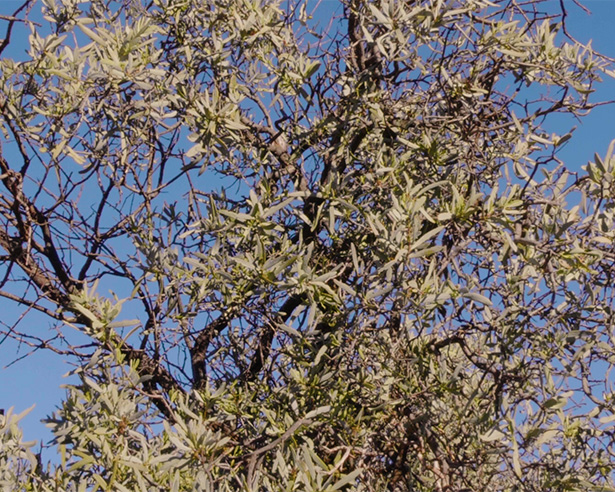
Sandalwood
Sandalwood
In recent years, the community formed Dutjahn Sandalwood Oils (DSO), a 50% aboriginal-owned sandalwood oil-processing venture with a 100% aboriginal controlled nonprofit foundation. Its mission is to improve and broaden the indigenous community’s benefit share in the natural resource supply chain and to build a nature-based cultural economy, by working with the local government to grant a license to sustainably harvest indigenous flora from their desert homelands under fair and equitable terms. Aveda has remained one of the biggest supporters of Dutjahn and introduced Dutjahn as a partner and supplier to many of the industry’s biggest fragrance houses.
Dutjahn Sandalwood Oils x ELC: Creating a Beautiful Future Together
In fiscal 2019, Dutjahn was one of 22 indigenous communities from around the world to receive the UN Development Programme’s Equator Prize, which recognizes local and indigenous organizations that showcase innovative, nature-based solutions for tackling climate change, environment and poverty challenges. The Estée Lauder Companies is proud to partner with Dutjahn; we remain bound by our shared values of respect, learning through listening, commitment to the well-being of all those involved and to the land that sustains life.
Read more about the company's partnership with Dutjahn Sandalwood Oils.
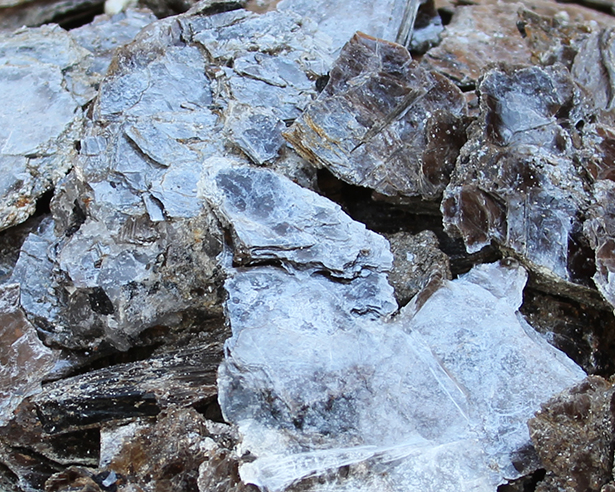
Mica
Mica
A portion of the mica used in the cosmetics industry comes from the Indian states of Jharkhand and Bihar. These two areas make up India’s “mica belt,” where the mica mining industry remains a key contributor to the regional economy.
In 2005, The Estée Lauder Companies (ELC) partnered with local non-governmental organization (NGO) Bachpan Bachao Andolan, now known as the Kailash Satyarthi Children’s Foundation (KSCF), to begin to address some of the issues surrounding child labor in the mica mining industry. KSCF works with local communities in the region to develop proactive and sustainable solutions to eradicating child labor in the Indian mica mining industry, including the development of Bal Mitra Grams (BMGs) or Child Friendly Villages.
The Kailash Satyarthi Children’s Foundation x The Estée Lauder Companies: Partnering to Address Child Labor in Mica Mining
An effective model that has been adopted by other organizations, a Child Friendly Village seeks to ensure that none of its children work in the mica mines by promoting education and enrolling children in school. They also assist in the formation of child councils, which empower youth to be self-advocates and find ways to work with local governments to address critical child rights and issues like gender parity and access to food and water. Through June 2022, ELC has supported the establishment of more than 290 Child Friendly Villages.
Our partnership with KSCF demonstrates how a collaborative model—one that utilizes the expertise of organizations on the ground working directly with local communities and listening to their needs—can lead to lasting solutions to issues that exist in the global supply chains. This model has been recognized as a best practice by the National Commission for Protection of Child Protection Rights (NCPCR) and the University of Delhi School of Social Work.
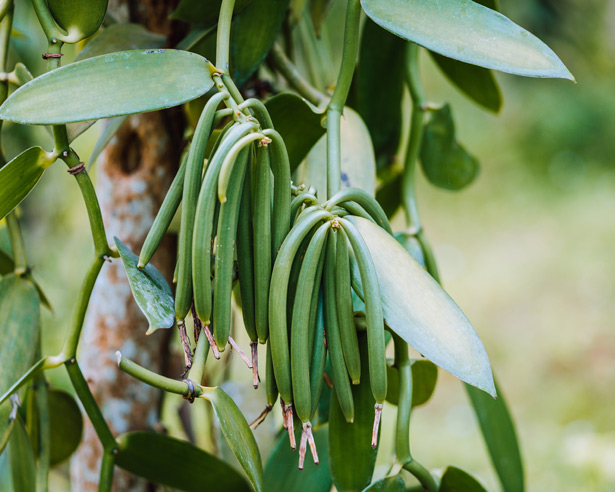
Vanilla
Vanilla
Advancing Supply Chain Transparency with Blockchain-Enabled, Traceable Vanilla
The livelihood of smallholder vanilla farmers in Madagascar depends on successful harvests, but crop production is a delicate task. Vanilla plants must be tended to for three to four years before bearing pods, and the country is vulnerable to extreme weather conditions such as drought and flooding.

As of fiscal year 2020, our Responsible Sourcing team and Aveda use blockchain technology to trace the Madagascan vanilla supply chain from harvest through production. We partnered with BSR, (En)Visible and IFF/LMR, one of our strategic suppliers, to bring the project to life.
Farmers were provided a digital ID card that conveys their unique traceability code via a QR reader. Using mobile phones and QR code IDs, data is now captured directly from a farmer upon purchase of the vanilla. The product and producer information is recorded on a blockchain, forming an immutable chain of custody. From the time the vanilla leaves the producers’ hands, it is tracked through the supply chain via the blockchain to validate quality and authenticity.

Our objectives with this project are to increase transparency and traceability within one of our more complicated and sensitive supply chains. We also seek to promote fair and inclusive business practices to support those who help us bring the beauty of vanilla to our customers around the world.
Read more about the company's Blockchain-Enabled, Traceable Vanilla
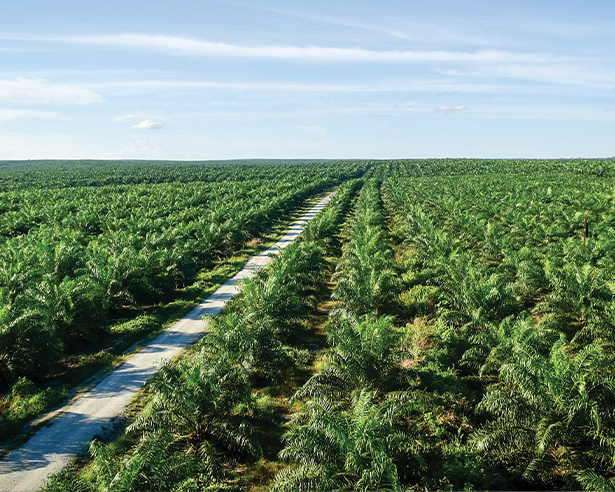
Palm Oil
Palm Oil
Project Lampung: Supporting smallholder farmers to increase availability of sustainably produced palm oil
In fiscal 2019, The Estée Lauder Companies (ELC) announced a three-year partnership with chemical giant BASF, RSPO and the NGO Solidaridad to work with smallholder Indonesian palm oil farmers (farmers who own or cultivate farms that are less than 2.0 hectares of land). Approximately 40% of the world’s palm production comes from smallholder farmers who rely on it for their livelihoods and who are key stakeholders in the value chain. The project launched in Lampung, Indonesia, and targets 1,000 independent Indonesia smallholder farmers.

The project supports farmers to improve their livelihoods and their sustainable production of palm oil and palm kernel oil by offering continuous education and technical assistance on how to implement and maintain sustainable palm oil practices. The project’s goal is that a minimum of one-third of the supported smallholder farmers become certified according to the Smallholder Standard of RSPO at the end of three years.
ELC is proud to be collaborating with its partners and the Indonesian government to foster this sustainable palm oil production supply chain in Lampung, one that is free from deforestation and still competitive in the global market, while at the same time increasing the social and economic benefits for farmers.
Read the company’s Palm Oil Action Plan
Read more about Project Lampung
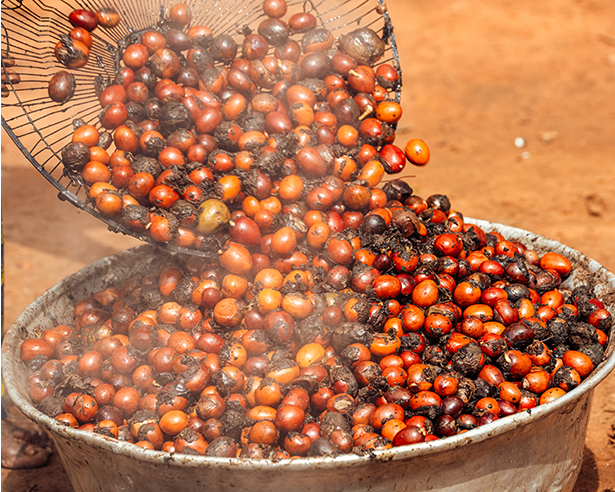
Shea
Shea
In 2022, with the support of The Estée Lauder Companies Charitable Foundation (ELCCF), BSR developed and piloted a bespoke program aimed at supporting women working in the shea supply chain in northern Ghana, marking the first time its financial resilience training was designed for smallholders in the ingredient side of the beauty supply chain. The program was implemented at two shea cooperative sites in the Janshegu and Mole Crema communities of northern Ghana with the aim to establish a scalable delivery model for both the beauty sector and beyond.
The pilot’s scoping took a community-informed approach, gathering feedback from women shea nut collectors and processors in the identified villages. While shea collecting provides supplemental income to their households, scoping revealed that the most in-demand need was for access to financial trainings and literacy, such as skills for saving and borrowing, to further enhance the work already underway by the women. Based on these key learnings, a bespoke training model focused on finance was created to help support the needs of the communities. The resulting pilot reached more than 1,000 women across the two cooperative sites with tailored trainings in financial planning, budgeting, money management, and family discussions about finances, with eighty women shea nut collectors and processors volunteering as peer educators.
Advancing Possibilities: Financial Literacy Training for Women in Shea
Read more about ELCCF’s work with BSR in the shea supply chain
